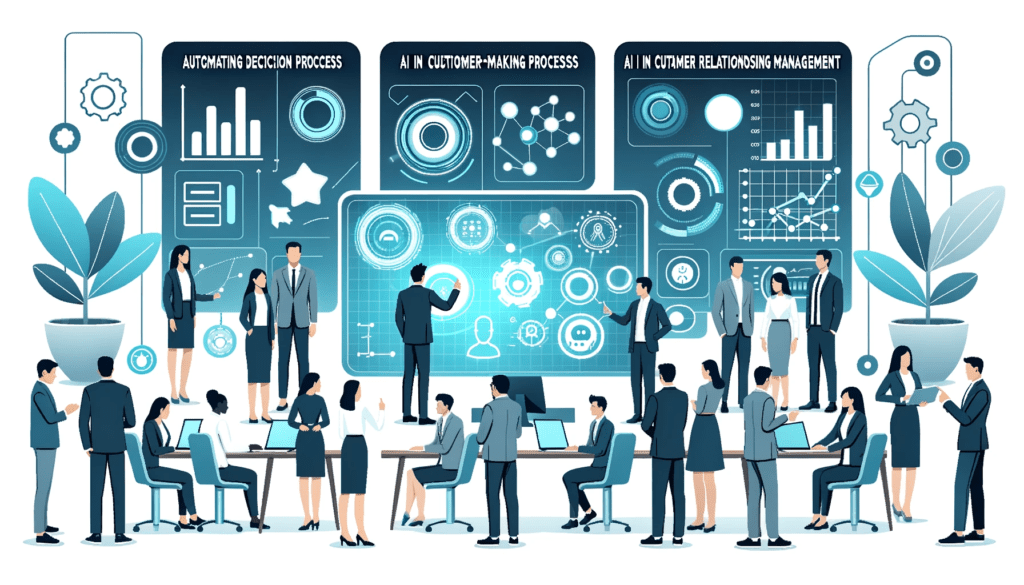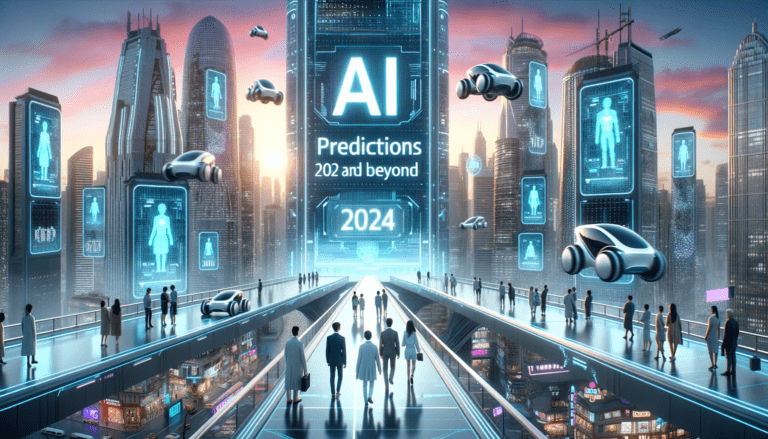The advent of artificial intelligence has sparked numerous debates, inclinations, and predictions about its future dynamics. AI predictions project a remarkable shift in various sectors such as healthcare, education, business, and more, as this transformative technology continues to advance. Identifying future trends of artificial intelligence is pivotal in understanding how we can leverage these advancements for a sustainable and evolving society. Each sector indeed has its unique forecast and set of implications, thereby making it crucial to compartmentalize and delve deep into these domains.
Such comprehensive AI trend analysis, backed by thorough research and insight, can serve as a roadmap to the plausible AI future we're marveling at. The future trends of artificial intelligence can no longer remain a construct of fiction or hyperbole. These are real, imminent transformations that hold great potentials to resolve our everyday challenges, drive efficiency, and open doors to unexplored opportunities. Our journey in this article, hence, embarks on a voyage towards a clearer future, untangling AI trend for each mentioned sector and the substantial geopolitical implications, converging technologies, evolving public perceptions, and innovations in the making.

Sustainable AI Development
In the landscape of the future of AI technology, predicting sustainable development has become increasingly vital. Whether it's the pursuit of 'Green AI Technologies' that prioritize energy-efficient algorithms and hardware, or the integration of comprehensive ethical frameworks to address AI’s societal impact, sustainability forms the bedrock of AI evolution. These predictions about AI focus on its long-term viability and aim to balance the technological advancements with environmental, ethical and societal needs, ensuring that AI innovations of the future contribute positively to all spheres of life.
An intriguing manifestation of AI's evolution is the 'ai generated Mario,’ a fascinating demonstration of AI’s creative potential. Essentially, artificial intelligence is able to generate classic Mario-style video game levels, exemplifying not just AI's ability to create, but also its potential to revolutionize the gaming industry. Furthermore, when A.I. predicts or generates the future, it adds another dimension to the role it plays in defining what's to come. It’s this kind of groundbreaking and sustainable AI development that will shape the future, driving innovation while also adhering to values of responsibility and longevity.
AI in Healthcare
The realm of healthcare is set to undergo a significant transformation, courtesy of the expansive capabilities of AI. Drawing upon the predictions made in the "Prediction Machines" book, the implications are colossal; the era of "Is AI a fad?" will soon be behind us and vital progress suggests a future where AI picks the most effective personalized care treatments. With the benefit of predictive analytics, AI will be able to forecast health risks, detect early symptoms, and even recommend preventative measures, thereby redefining the concept of personalized care.
In accordance, trends of AI signal towards revolutionary advancements in AI-powered robotic surgeries. These are not the elementary mario chatbot AI we were acquainted with in the past, but highly sophisticated algorithms capable of accuracy to a decimal point, precision, and dexterity beyond human capabilities. They can perform complex surgical procedures with minimum invasiveness, significantly reducing recovery time and risk of complications. Moreover, their success rates are projected to increase continually, as AI models learn and evolve from each operation performed. Essentially, AI is poised to elevate healthcare to dizzying heights, exhibiting its sustainable development throughout.

AI in Business
In the domain of business, prediction machines, also known as artificial intelligence, have started revolutionizing the traditional approach. A term coined in the book 'Prediction Machines: The Simple Economics of AI', these systems are significantly enhancing business decision-making processes. By efficiently analyzing vast sets of data, these machines help businesses in predicting future trends, customer behavior, market dynamics, and more. According to Forbes, the role of AI in business is accelerating at an unprecedented pace, creating new avenues for enhanced productivity and profitability.
On the one hand, 'Futures AI' is propelling businesses into the era of digital transformation, offering business insights, risk assessments, and strategic guidance. On the other hand, 'Surreal Touch AI' is crafting immersive customer experiences by blending artificial intelligence with other cutting-edge technologies.
These technological advancements are not some distant predictions but an ongoing evolution. As surreal as it may sound, businesses today are leaning on AI to analyze emotions, predict customer desires, and provide a personalized customer relationship management (CRM) strategy. Consequently, the artificial intelligence predictions for 2024 and beyond envision AI to be an intrinsic part of business operations, guiding decision-making and strategy development processes.

AI in Education
Amid the resounding discussions about AI technology future, an interesting juncture is the integration of AI into the education sector. To sustain the manifold benefits of this technology, a convergence is being witnessed where education, the backbone of societal progress, is embracing the opportunities with AI.
An exciting horizon lies in ai predictions, where the personalized learning paths are no more a theoretical contemplation but a live reality. The educational curriculum, tailored for each student based on individual grasping speed, interest areas, and learning style, could be the reality of the future. MSM AI generated models are being increasingly researched to deliver this unprecedented customization, thereby revolutionizing the learning journey.
Meanwhile, the second pivotal facet of AI in education is the robust classroom management it envisages. With the integration of AI, classrooms of the future could morph significantly from their current design. Predictive analysis, a key tool in AI's kit, plays a significant role in such transformation.
The AI predicts future classroom needs, including student attention patterns, learning habit tracking, and emotional understanding. This enables a more coherent and efficient learning environment, anticipating disruptions, understanding learning lacunas and ensuring constructive student-teacher interactions. As the future of ai unfolds, our expectations from education mould with it, underlining the vast potential that lies in AI's education landscape.

Geopolitical Implications of AI
The future of AI involves a complex interplay of technological advancement and geopolitical strategy. Nations worldwide are recognizing the strategic importance of artificial intelligence, sparking a global competition for AI supremacy. National AI strategies are being devised and fortified, with global powers such as the United States and China leading the way, while emerging players are rapidly scaling up their capabilities. The future AI landscape could see some countries strategically leveraging AI to redefine global security dynamics, augment their defense capabilities, and shape international norms and conventions. The study of AI trends at the geopolitical level thus becomes a critical aspect of understanding the future of artificial intelligence.
Prediction AI, in this context, becomes an essential tool for discerning global patterns and possible trajectories of AI development. As nations vie for control in the AI space, forecasting trends can help policy markers anticipate shifts and plan accordingly. For example, predictive models could signal an impending leap in AI capabilities that challenges the current balance of power, or alert to the risk of AI being utilized maliciously.
As such, embracing prediction AI can aid in preparing for potential geopolitical shifts, providing invaluable insights for policymakers and stakeholders in navigating the increasingly complex realm of global AI politics. The geopolitical implications of AI, therefore, extend far beyond technology, shaping the contours of power, influence, and diplomatic relations in the future AI-driven world.

| Category | Prediction | Source |
|---|---|---|
| Generative AI Trends | Bigger and more powerful models, Electoral Interference, Generative Design, Generative Video and Audio, Multi-Modal Models, Autonomous Generative AI | Forbes |
| Regulatory & Ethical | AI Oversight Committees, Delayed EU Legislation | Technology Magazine |
| Deployment Challenges | Reality Check for Generative AI | Technology Magazine |
| Data Science Trends | Increased use of Synthetic Data | Gartner |
| Conversational AI | Expansion of Tasks | |
| Other Trends | Connectivity Performance Rating | Technology Magazine |
AI PREDICTIONS: Technology Convergence
Artificial Intelligence (AI) is taking huge strides and painting a new landscape for our future. AI future predictions indicate a vast scope of technological convergence where AI will not operate in isolation, but as part of a larger ecosystem in harmony with other technologies such as the Internet of Things (IoT) and Blockchain. The integration of AI with these technologies is expected to automate and optimize many areas of our life, ranging from data-sharing and privacy, smart homes to complex business operations.
AI algorithms enabled by IoT and Blockchain will not only make our devices smarter but also help deliver more secure and transparent services. Another area of focus is how AI will change the future of work, making many jobs redundant while creating new ones in its stead. AI's advancements will not only support mundane tasks but also engage in sophisticated jobs, like data analysis and predictions, which will help in better business decision-making.
This underlines the crucial aspect of technology convergence in enhancing business strategies, making AI prediction pivotal in planning and executing innovative visions for the future. AI-enabled Augmented Reality (AR) and Virtual Reality (VR) are also set to transform the entertainment, gaming, education, and real estate industries, proving that the possibilities are only bound by our imagination.
Public Perception and Regulation
Public perception of AI has fluctuated over the years, varying from fantastical dreams of future intelligence to dystopian fears associated with the question, "what will artificial intelligence do?" As technology continues to progress, these views shape the dialogue surrounding AI's regulatory environment. Public sentiment informs lawmakers and highlights areas that might require oversight or regulation, influencing the prediction of artificial intelligence's future. Regulatory landscapes are in a constant state of evolution as they strive to keep pace with rapid advances in technology. Legislation, privacy concerns, and ethical considerations remain at the forefront of these discussions.
As lawmakers seek to better understand and regulate AI systems, numerous AI predictions have arisen. As a result, there is a growing focus on ensuring that the advancement of AI aligns with societal expectations, pointedly addressing futures predictions that wallow in catastrophe scenarios or utopian visions of AI. The question is no longer whether AI will continue to integrate into everyday life, but how it can be done so responsibly, optimally balancing the risks and rewards. The dialogue surrounding regulation reveals much about our society's hopes, fears, and expectations for artificial intelligence in the coming years.
Based on above discussion you will see the boom of AI in 2024 and in future here are the key points:
| # | Key Points |
|---|---|
| 1 | Public perception of AI fluctuation |
| 2 | Influence of public opinion on regulatory environment |
| 3 | Concerns highlighting areas for oversight or regulation |
| 4 | Evolving regulatory landscapes |
| 5 | Legislation for responsible AI use |
| 6 | Privacy concerns and data protection |
| 7 | Ethical considerations in AI regulation |
| 8 | Predictions on AI's future development |
| 9 | Aligning AI advancement with societal expectations |
| 10 | Integrating AI responsibly in daily life |
| 11 | Dialogue revealing societal hopes, fears, and expectations for AI |
| 12 | Desire for innovation with safety standards |
| 13 | Fear of losing control over potentially harmful technology |
| 14 | Expectation for ethical and responsible technology development benefiting society |
Innovations on the Horizon
Examining predictive trends is vital in understanding the trajectory of AI's evolution and impact. Current advancements point towards a new era of significant discovery and complexity, where AI becomes an omnipresent tool across various sectors. The development of Quantum Computing and AI signifies the emergence of sophisticated algorithms and computational power, which is set to revolutionize data processing, analytics and decision-making capacities like never before. The idea of quantum superposition and entanglement urges us to redefine our conception of computing, problem-solving, and information security, hence widening the horizon of likely AI innovations significantly.
However, the future AI trends are not solely confined to technical advancements. Our ability to identify the existing trend is also equally critical in ensuring that AI development is rooted in sustainability and ethical frameworks. The dramatic improvements in AI models will count for nothing if they infringe upon rights or deplete resources at an unsustainable rate.
The transition towards green AI technologies signals a sense of responsibility and caution in moving beyond pure optimization to considering broader environmental and ethical implications. Thus, future AI necessitates a balance between spearheading technological innovation and ensuring its responsible and sustainable development.
Navigating the whirlwind of ai predictions for the future is an intriguing task that sheds light on potential shifts in varying sectors. Amidst the plethora of probable advancements, it is crucial to consider the implications of these fast-paced improvements. As we peer into 2024 and beyond, the AI journey encompasses various domains, including sustainable development, healthcare, business, education, geopolitics, technology convergence, public perception, regulatory landscapes, and nascent innovations poised to redefine our world.
The article is premised on the understanding that sustainable AI development is no longer a luxury but a necessity – balancing the immense potential of AI with ethical considerations and the drive towards environmentally friendly "Green AI" solutions. In terms of sector-specific implications, AI's predictive analytics in healthcare offers promising strides in personalized care and advanced surgical techniques.
In the corporate world, AI transforms business dynamics through automation and improving customer relationship management. Simultaneously, education faces an innovative upheaval with personalized learning paths and improved classroom management, driven by intelligent algorithms.
As borderless as technology may be, its deployment on a global scale stirs up geopolitical implications, with countries strategizing to harness AI's power for security and competition. Moreover, as AI converges with other technologies such as IoT and blockchain, the potential for growth and innovation amplifies.
Yet, the strides of technology must also contend with the evolving public perception and regulation norms that lend a delicate balance between fueling innovation and maintaining societal trust. Lastly, the horizon holds a new dawn of innovations with the integration of quantum computing and AI, along with the emergence of new AI algorithms set to redefine our understanding of machine learning and prediction models.
What is the main point of the article?
The article broadly discusses the implementation, impacts and future of Artificial Intelligence in different sectors like healthcare, business and education, and its geopolitical implications.
Can you elaborate on sustainable AI development?
The article discusses sustainable AI development as a process that ensures the use of artificial intelligence is socially beneficial, economically viable, and environmentally friendly across its lifecycle.
How is AI utilized in the healthcare sector?
The article explores how AI is transforming healthcare through predictive analytics, disease detection, remote patient monitoring, and personalized medicine.
What is the role of AI in business?
According to the article, AI plays a significant role in business, helping to automate processes, analyze complex data, enhance customer experience, and drive innovation.
How is AI impacting the education sector?
The article suggests that AI is revolutionizing education by enabling personalized learning, automating administrative tasks, and providing real-time feedback to students.
Can you explain the geopolitical implications of AI?
The article discusses how AI's global role can influence geopolitics, including the balance of power, cybersecurity issues, and international laws and norms.
What is meant by technology convergence in the context of AI?
Technology convergence refers to the integration of AI with other technologies like IoT, cloud computing, and big data to drive synergistic innovations.
What does the article say about public perception and regulation of AI?
The article suggests that public perception of AI is mixed, and there is a growing need for regulation to ensure ethical use of AI and protect individuals' rights.
Could you tell me about some of the innovations on the horizon?
The article discusses several forthcoming AI innovations, including advancements in machine learning, robotics, natural language processing, and more.
What is the conclusion of the article?
The conclusion emphasizes the transformative potential of AI across sectors and its future impacts, while underscoring the importance of ethical considerations, regulatory frameworks, and public engagement in AI development.





Pingback: Bioengineered Organs The Promising Pathway: 7 Game-Changing Innovations - techlooters.com